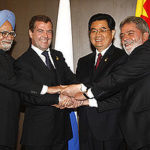The most interesting development in world affairs this week is not the election outcome in Iran; nor is it President Obama’s National healthcare plan, and neither is it N. Korea’s saber-rattling hyjinx. It is the first Economic Summit meeting of the so-called BRIC group of Emerging Market nations — Brazil, Russia, India and China — and it is intended to underscore the rising economic, political and military might of these four major developing countries and their rising chorus demanding a greater voice in global matters.
The four BRIC nations — which account for 15 percent of the $60.7 trillion global economy — will focus on ways to reshape the global financial system after the economic crisis.
Nothing in this development necessarily poses a threat to U.S. financial, economic, nor military dominance. But it does portend a certain future where American influence is diminished, or at least checked by the rise of highly influential regional powers who, like teenagers seeking to define their roles in the world, no longer look, nor want, the paternalism of American leadership.
And, perhaps most importantly, these four nations alone own about 40 percent of global currency reserves. Brazil, India and China have also admirably weathered the current global financial crisis substantially better than any of the major developed economies, and better than the world as a whole. While they are far from a monolithic group, they are generally united in their frustration with the dollar’s status as the world’s reserve currency, which gives the U.S. a central role in the global economy, and enables Washington to run budget deficits without fears of facing the kind of budgetary day-of-reckoning that other countries might risk. All four countries have expressed varying degrees of discomfort with Washington’s financial stewardship, and are particularly concerned about the value of the dollar at a time of rapidly mounting indebtedness in the United States.
When the leaders of Brazil, Russia, India and China gather for their first full-fledged BRIC Summit, they will be closely watched by Global Markets players for signs of policy shifts that could affect the global role and the declining strength of the Greenback (i.e., U.S. dollar). During the Tuesday 16 June summit in the Ural Mountain city of Yekaterinburg, Russian President Dmitry Medvedev is likely to reprise Russia’s call for a new global reserve currency to augment the dollar. The Russian proposal reflects both the Kremlin’s push for greater international clout and a concern shared by other BRIC markets that soaring U.S. budget deficits could spur inflation and weaken the dollar. Russia, China and Brazil recently announced their intention to invest in International Monetary Fund bonds to diversify their dollar-heavy currency reserves. IMF bonds are denominated in Special Drawing Rights (SDRs), an artificial currency used by the IMF. While this has raised fears that the greenback could be further weakened, analysts say BRIC nations can offer no viable alternative to the dollar — although the China’s finance minister has recently expressed “concerns” about their reserves denominated in U.S Treasury bonds, and have suggested a basket of international currencies as an alternative to the greenback as the global currency of choice.

BRIC Summit Leaders
Still, some economists say the BRIC countries can do little to change the current architecture of the global financial system, and that the outcome of this meeting will be largely symbolic. Before the leaders of Brazil, Russia, India and China meet, a summit of the Shanghai Cooperation Organization (SCO) of Central Asian powers will also underline the growing international stature of China and Russia — an alliance, some say, was driven together as a consequence of some of the more alarming aspects of U.S. foreign policy under former President George Bush.
In terms of U.S. Economic Foreign Policy, there is much to be concerned about in this development. This Summit and its resulting priorities for the BRIC markets may pose a direct competitive challenge to the greenback. In addition, as both an economic center of influence made presciently clear in the April 2009 London G-20 conference; as well as potentially as a BRIC military alliance, the relative global power and influence of these nations are quickly rising. India, and to a lesser degree, Russia, continue to be anchored economically to the major western economies. However, China and Brazil are second only to the U.S. in negotiating bilateral trade agreements in far-flung regions that promise to increase their global economic clout. Along with the emergence of an Arab Central Bank currently underway that will also establish the Arab Middle East as a central G-20 economic power, these are developments that promise to pose new challenges — as well as new opportunities — for U.S. economic interests around the globe.